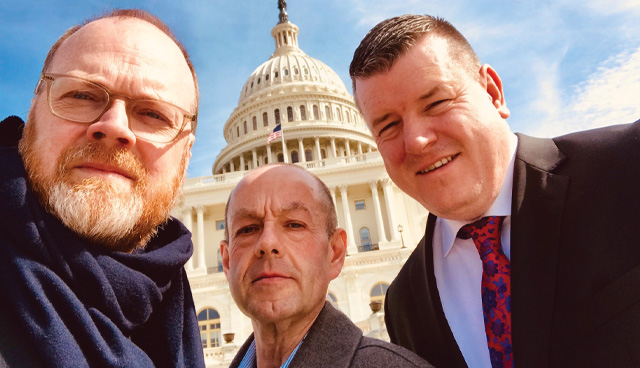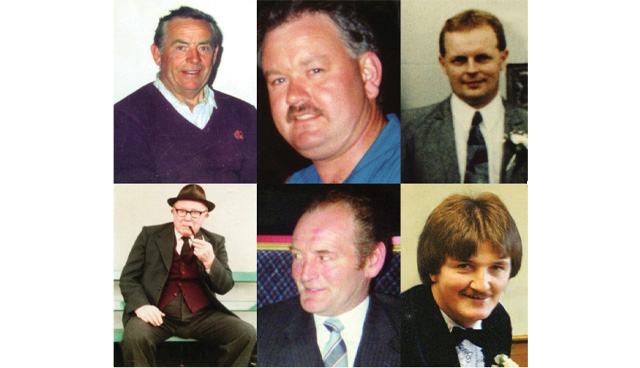Loughinisland journalist settlement

Two journalists arrested by the PSNI over the alleged theft of a Police Ombudsman document that subsequently appeared in the No Stone Unturned documentary focusing on British security force collusion in the Loughinisland massacre have subsequently been awarded damages in a High Court judicial review in Belfast.
On 19 June 1994, during the USA ’94 World Cup game between Ireland and Italy, UVF gunmen entered the tiny lounge of The Heights Bar in Loughinisland, County Down and opened fire, killing six local men and injuring five more. No one has ever been convicted for the killings.
No Stone Unturned explored in forensic detail the failings of the British security force investigation into the 1994 attack and allegations of collusion. The Emmy Award nominated documentary was released in Irish cinemas on 10 November 2017.
Then, on 31 August 2018, producer Trevor Birney and journalist Barry McCaffrey were arrested by the PSNI as part of Operation Yurta, an investigation into the alleged theft of confidential Police Ombudsman for Northern Ireland (PONI) material. Led by detectives from Durham Constabulary, supported by PSNI personnel, the two men’s homes and the office of Fine Point Films production company were raided with documents and computer equipment seized.
The journalists were then subjected to 14 hours of questioning in connection with suspected theft of documents, handling of stolen goods, Section 5 of the Official Secrets Act 1989 and data protection breaches. While being questioned, the journalists were informed that PONI had reported the theft of two confidential documents to the PSNI on 4 October 2017. However, on 8 November 2018, the Police Ombudsman Michael Maguire told the Irish Times: “We did not make a complaint of theft.”
The leaked material, which appeared in No Stone Unturned, was delivered to the journalists anonymously via a plain envelope in the post with no return address.
Ex parte warrants
Under the Police and Criminal Evidence Act 1984, it is customary practice that journalists are issued with a production order which can then be challenged in an open court. Instead, on 10 August 2018, ex parte warrants to search the homes of the two journalists as well as the Fine Point Films office were authorised.
The rationale cited for this decision was informed by McCaffrey’s refusal, as per the NUJ’s ethics code, to reveal a source to Metropolitan Police Service at the request of the PSNI in June 2012.
Legal challenge
However, on 7 September 2018 legal representatives for the journalists challenged the legality of search warrants at the High Court in Belfast. On 4 February 2019, Birney and McCaffrey secured permission to challenge the legality of the search warrants.
On 31 May 2019, the warrants for the arrest of the two journalists were subsequently quashed by the High Court in Belfast. Later, on 10 July 2020, the 19-page written judgement relating to that decision was published. The judgement indicated that there was “no confidence that the trial judge applied the right test” when authorising the ex parte procedure.
Referring to efforts to “take all steps to try to protect the identity of the source”, the judgement stated: “There is nothing suspicious or inappropriate about this. It is exactly what one would expect a careful, professional investigative journalist to do in anticipation of any attempt to identify a source.”
Concluding, the judgement asserted: “The conduct of this hearing fell woefully short of the standard required to ensure that the hearing was fair. That was sufficient for our [Morgan, Treacy and Keegan] decision to quash the warrant… We see no overriding requirement in the public interest which could have justified an interference with the protection of journalistic sources in this case.”
On 16 July 2020, PSNI Chief Constable Simon Byrne issued a statement outlining that he had “written to both Barry McCaffrey and Trevor Birney offering them an unreserved apology for the distress and upset caused to them and their families”, adding, “I fully accept the ruling of the Lord Chief Justice that the search warrants were unlawful”.

(Bottom L to R) Barney Green, Malcolm Jenkinson and Eamon Byrne
“What we do know is that the Loughinisland families will wake up tomorrow morning not one inch closer to knowing why the PSNI still refuses to bring the perpetrators of the massacre to justice.”
— Barry McCaffrey
Damages
On 26 November 2020, the two-year judicial review culminated with the PSNI agreeing to award damages to each of the journalists and the production company behind the documentary. In total, the PSNI will pay £875,000 of damages split between Fine Point Films (£600,000), Birney (£150,000) and McCaffrey (£125,000). The settlement also included agreement on behalf of the PSNI to destroy all forensic samples linked to the case including photographs, fingerprints and DNA. Furthermore, Durham Constabulary and the PSNI agreed to delete all original copies, downloads and extracts of the material they took from the journalists.
In reaction to the settlement, Birney stated: “We launched a Judicial Review in the face of the PSNI’s most egregious attack on journalism to protect our journalism, our sources, and press freedom itself… Over the past two years, the PSNI fought our attempts to protect our journalism and sources every step of the way. They sought to defend their indefensible attack on press freedom right up until the judgment delivered by the Lord Chief Justice in July this year.”
McCaffrey added: “Millions of pounds of taxpayers money was wasted on our arrests and the PSNI’s utterly futile legal challenge to defend their unlawful actions… Sadly, I fear that no one will be held to account. Who knows how much damage this debacle has caused to confidence in policing?
“What we do know is that the Loughinisland families will wake up tomorrow morning not one inch closer to knowing why the PSNI still refuses to bring the perpetrators of the massacre to justice.”
To date, since the release of No Stone Unturned, no one has been arrested by the PSNI in relation to the killings at Loughinisland in 1994.





